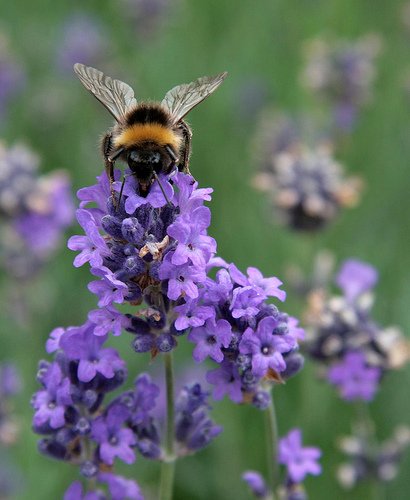

Features
Why we can’t afford to lose ecosystem services
Ecosystem services are crucial to our survival; we literally can’t afford to lose them. Increasing investment in and protection of these hugely important environmental assets can only be beneficial for future generations.
Ecosystem services provide us with the essentials of life. They’re what increase our happiness, health and prosperity. But their importance has become masked by the large corporations that put their branding on these services, transforming them into products.
Honey is one example; clean water another. Wheat, fuel, fibres – all necessities that have been taken from our natural surroundings and become contained, packaged and shipped around the world for us to consume.
What are ecosystem services?
Ecosystem services, as defined by the Department for Environment, Food and Rural Affairs (Defra), are “services provided by the natural environment that benefit people”. Fibre and fuel provision, food supplied by pollinators, and cultural and recreation services are the most commonly appreciated.
Other not-so well-known ecosystem services include the purification of air and water, flood protection, regulation of the climate, soil formation and nutrient cycling – all essential operations that fundamentally support life.
How do ecosystem services contribute to economic growth?
Currently, many ecosystem services are not traded in markets, and therefore remain unpriced. It is this unknown value that in recent years has boosted research into how the roles of natural environmental processes contribute to our economic growth.
A particular area that has attracted a lot of research is the service provided by pollinators. A report by Klein et al in 2007 estimated that 75% of the world’s most important crops and 35% of all globally produced food are reliant upon animal pollination.
Bees are the dominant species providing crop pollination services, but bats, birds, moths and other insects also contribute. A study by Constanza et al in 2007 estimated that pollinators were worth approximately $14 per hectare every year on a global scale. The researchers also found that 17 ecosystems held current economic value, totalling at an estimated $16-54 trillion per year.
With global gross national product sitting at approximately $18 trillion a year when the study was conducted in 2007, it provides real evidence that ecosystems truly are worth conserving and investing in.
Investing in ecological services
Payments for ecosystem services (PES) are one of the principle ways to establish a market for ecosystem services. PES can be defined as a payment to land managers to undertake actions that increase the quantity and quality of desired ecosystem services that will benefit both specific and general users.
PES work by addressing market failures through incentives. By offering land managers and others who affect the delivery of ecosystem services with direct payments, this allows better utilisation of the ecological goods. Most of these PES schemes are government financed; however, there have been an increasing number of PES schemes that have been financed by private companies and individuals.
New York City is acknowledged for providing one of the earliest and clearest examples of an ecosystem service in action. By paying $1.5 billion for water services to the Catskills and Delaware catchments, NYC saved between $8-10 billion that a water filtration plant would have cost.
“By these means, the City secured a reliable water supply of about five billion litres of water daily for over 9 million consumers in the City and several suburban counties”, the United Nations Environment Programme (UNEP) wrote in its Green Breakthroughs book.
“This supply is delivered by means of a complex network of reservoirs, aqueducts, tunnels and pipes. The system depends on a 5,200 square kilometre catchment that spans eight counties in New York State, some 73% of which is under forest.”
If we look closer to home, there are a great number of PES examples thriving in the UK. SCaMP, or Sustainable Catchment Management Programme, for example, aims to develop an integrated approach to catchment management in the north-west of England.
“We own 56,385 hectares of land in the north west, which we hold to protect the quality of water entering the reservoirs”, the company says.
“Much of this land is home to nationally significant habitats for animals and plants, with around 30% designated as a Site of Special Scientific Interest (SSSI).”
The project – a partnership between the United Utilities and the RSPB – represents a good example of how private, public and non-governmental organisations can manage the land to gain benefits from ecosystem services including improved water quality.
Why invest in PES?
Here are just a few quick pointers on why supporting and investing in PES methods is beneficial:
– Creating a link between beneficiaries and providers can strengthen the integration between the natural environment, society and economy
– PES links can generate opportunities in engaging a broad spectrum of stakeholders which could deliver improved outcomes for the natural environment and its many beneficiaries at a local, catchment, national, biodiversity and potentially international level
– It allows opportunities for new financing streams and private PES schemes to emerge
– Establishing these market opportunities provides conservation for these ecosystem services
– Allowing those who deliver ecosystem services to do so in a cost-effective way can benefit the entire population
– The more ecosystem services become included into the formal economy the more mainstream the provision becomes. This will allow a great expansion of opportunities in jobs, innovation and investment
In summary, investing in ecological services brings together biodiversity and the environment to generate assets that enhance economic performance, improve quality of life, and offer new opportunities for employment.
Enhancing the condition of these environmental assets will increase the stream of benefits that we can receive now and for the many future years to come.
To support payments for ecosystem services, the Food and Agricultural Organisation of the United Nations (FAO) has put together a well-rounded summary of paying farmers for environmental services, in a report called The State of Food and Agriculture 2007.
“Farmers constitute the largest group of natural resource managers on Earth“, the FAO said.
“They both depend on and generate a wide array of ecosystem services. Their actions can both enhance and degrade ecosystems. Thus, Understanding what drives their decisions is critical in designing new strategies that enhance ecosystem services and contribute to sustainable growth.”
Further reading:
Bee protection ‘essential’ after scientists link decline in numbers with insecticides
Government urged to make 2013 ‘the year of the bee’
MPs blame bee decline on common insecticide
UN: invest responsibly in agriculture to beat global poverty
Agricultural responsible investment principles set for consultation
































